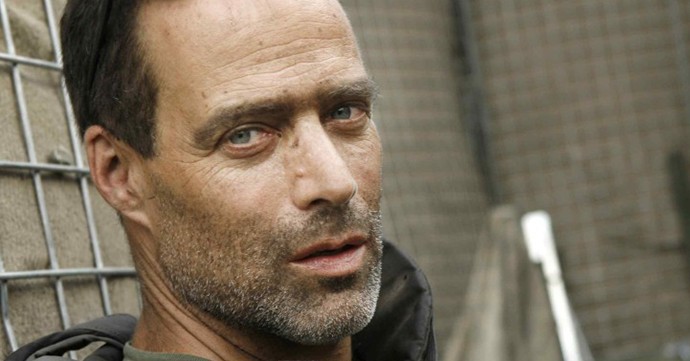
Our film of the month for May is the celebrated war documentary RESTREPO – but really, this month is about looking into a trilogy of films by Sebastian Junger – RESTREPO, KORENGAL, and THE LAST PATROL – and the unique look they give us into something far beyond war. This trilogy is about brotherhood, bravery, loyalty, fear, and the sometimes harsh reality of coming home.
Sebastian is a celebrated filmmaker, author and journalist who happens to come from a place I have spent a good deal of my life. When the film adaption of his best selling book, “The Perfect Storm,” premiered in our small town, the theater was packed to the brim and us middle school kids sat on the floor in the aisles and everyone cheered as the credits rolled. It was one of the first experiences of a film that I felt a personal connection with – and Sebastian’s storytelling continues to draw me in, connecting audiences and me to the reality of war, building compassion for something that, for many, would otherwise be distant and ungraspable concept.
What is it that draws you to documentary filmmaking?
I thought that the camera could capture things that words couldn’t, and vice versa. I wanted people to be able to experience combat in the most complete way possible. For me, that meant giving film a try.
Making RESTREPO began a filmmaking journey for you – how did you first get involved with that initial film, and did you have any expectations that it would lead you down the path it has?
I wanted to write a book about a platoon in combat for a year. I thought that if I was going to spend that much time out there I might as well shoot a lot of video as well. Maybe I could make a film; but at the very least it could help me in the writing of a book, because its hard to keep notes during combat.
Beginning with that experience, continuing with WHICH WAY TO THE FRONTLINE FROM HERE? and KORENGAL, and concluding with THE LAST PATROL, your films have followed a very natural progression given your own personal journey. Over the course of these four films, you have transitioned from filmmaker to film subject. Can you tell me a bit about that journey and how that transition unfolded?
I never intended to make myself a film subject – a big transgression in the world of journalism – but I realized after Tim died that my professional life and my personal life had irrevocably collided and merged. Reluctantly I allowed my editor to interview about my experience with Tim for ‘Which Way.’ And when I made ‘The Last Patrol’, I also realized that my experience and involvement was part of a larger story and that there was no shame in putting myself in there.
The Last Patrol is a very cathartic film. Reintegrating after war can be a challenging experience, and you choose to walk on foot from Washington D.C. to Pennsylvania with the hopes of getting to know the country, and yourself, again. Do you feel that making this film brought you the closer to what you were looking for?
Yes, very much so. I feel like I didn’t really know my country very well until I walked through it. I didn’t really know very poor people, I didn’t really know rural people, I had a lot to learn. And I also walked off a lot of personal confusion and anguish. My marriage was ending during the patrol as well. So I had a lot going on in my life and the exhaustion and the brotherhood and the sheer weird hardness of the trip was enormously beneficial to me.
What has been the primary conversation you have observed people are having around the RESTREPO Trilogy? Has it stirred up any unexpected reactions?
I think mostly people were surprised by how hard and physical the combat was (we’re supposed to be a high-tech army!) by how much soldiers like to fight, and by the psychic costs of killing even for very enthusiastic men.
Often after watching documentaries, people feel moved to learn more, take action or get involved in some way. Is there anything that you recommend to people who feel inspired by the Restrepo Trilogy?
Well I started a non-profit called Reporters Instructed in Saving Colleagues to give medical training to freelance war reporters, so that people like Tim have a chance at surviving their wounds. We exist through donations, Otherwise, I think people might understand war to be a much more complex thing – morally and psychologically – than either liberals or conservatives are willing to admit. The more honest that we, as a society, can be about war the easier it will be for veterans to reintegrate into society.
And finally, do you have any favorite documentaries?
I very much liked Particle Fever, The Happy People, Man on Wire, The Last Days of Vietnam, Waltz With Bashir, Red Army, and Pussy Riot: A Punk Prayer.
____
RESTREPO is Influence Film Club’s featured film for May. Each month Influence Film Club hand-picks one of our favorite docs as our club’s featured film to watch and discuss together. Throughout the month, starting with our newsletter and continuing on our website and social media we will extend the conversation by exploring the various issues touched on in the film, providing filmmaker interviews, suggesting ways to Influence, and discussing documentaries in general – because after all, We Love Docs.
Interview by: Isis Graham